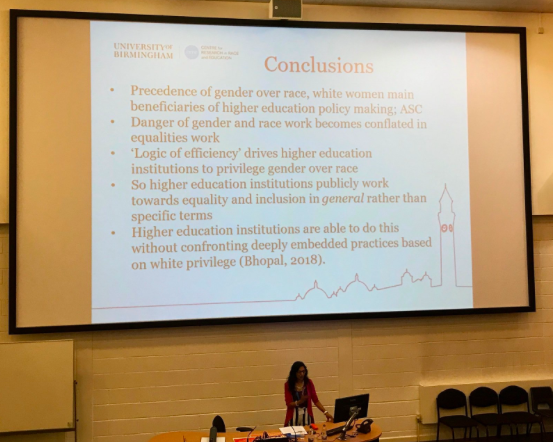I am Natasha Richards, a doctoral student at the University of Essex. The 2019 conference was my first experience with GEA – and it was incredible. The atmosphere was extremely welcoming, every single talk/workshop I attended was intriguing and informative, and the mix of academic and social activities provided excellent opportunities for networking. I made some useful contacts and (more importantly) some wonderful friends.

One of the standout sessions for me was on the first day with keynote speaker Professor Emma Renold. Her depictions of new research methodologies encouraged me to see and think differently within my own research. She highlighted the struggles with forming research methodologies, which I have found as a Practice as Research doctoral student, and emphasised that research practice operates at the threshold of academia and activism. She suggested that using art in research methodologies reconnects us to the history of subversive activism. There is currently powerful youth activism emerging around the world, so linking research, education, and activism when working with young people is pertinent and matters. Professor Renold stated that there are currently few dedicated resources to empowering young people. She showed a video of her work with AGENDA, which utilises creative approaches to educating young people. The session linked perfectly to my own research on creative approaches to relationship and sex education. At the end of the session I felt energised and inspired.
One of the elements of the conference that I loved was the raw honesty and vulnerability displayed by many of the speakers. In the panel discussion Navigating academia: From PhD to Professor, each speaker depicted different elements of their experiences, exposing the difficulties as well as the triumphs of their career journey. I appreciated the insistence that working class academics need to learn to stop being grateful in a system that is, actually, quite exploitative. Two of the panel members, Dr Jessica Gagnon (University of Portsmouth) and Dr Carli Rowell (University of Glasgow), conducted another session on being unapologetically working class. Their words were my words. They made me feel like I did belong in an environment that was not built for people like me. They expanded on the notions of gratitude as being linked with feeling like you shouldn’t be there. I left their session feeling validated. I left feeling inspired to believe in my own voice and to value my own journey into academia.
Feeling like you do not belong in academia is not solely an experience of working-class academics though. It was encouraging to hear a diverse range of academics discussing their feelings of “imposter syndrome” throughout the conference. In the talk Uplifting gender and sexualities education research: memoirs and manifestos for early career academics, Dr Leanne Coll (Deakin University) recited stories from people working in sexuality studies. She depicted feelings of having arrived too soon or being out of time. She encouraged academics to rethink the negative. The session encouraged me to consider two important points: “The story of becoming an academic is never a singular journey” and “you must make an informed choice of what kind of scholar you want to be”.

Many speakers in the conference addressed the inequalities experience by BAME students and academics. The conference made me consider unconscious bias, the notion of white fragility, and the impact that money can have on institutions’ inclination to act on intersecting inequalities. In her powerful keynote speech Competing Inequalities: Gender, Race and White Privilege in Higher Education Institutions in the UK, Professor Kalwant Bhopal (University of Birmingham) emphasises that “money doesn’t talk, money screams”. Investment into fighting inequalities, particularly with regards to race, needs to be financially backed, and it is likely this will only happen in institutions if it directly benefits the institutions themselves.
Going forward, I think it would be great to have a PhD student on the Executive Members Committee, or a separate advisory group of doctoral candidates, to bring a student voice to GEA planning and discussion and to help develop networks which encourage and generate the exchange of information and ideas between doctoral students and researchers at all career levels.
These are some of the key points from the conference that I am still contemplating:
- To believe in myself more
- To collaborate with a diverse range of people
- To feel confident to share initial research findings and gain feedback
- To understand and address unconscious bias
- To interrogate the extent to which my research is intersectional
- To appreciate that there is no right way to do academia
To close, I would like to encourage my readers to consider their own role in fighting intersecting inequalities, both within academic institutions but also wider society. In the words of keynote speaker Professor Emerita Heidi Safia Mirza (UCL Institute of Education): “Let’s be mischief makers”.


